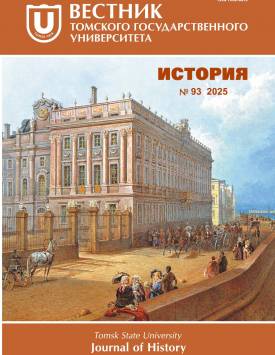Projects of re-construction of the state food system in the late imperial period
The aim of the work is to analyze the government campaign organized in the 90s. 19th century to revise legislation in the field of food supply for the population in case of crop failure and famine. As a result of the study, a retrospective review of government measures aimed at overcoming food shortages in the Russian countryside was carried out. A comparative analysis of the projects for the reorganization of the state food system. From 1822 until the end of the 19th century. the main mechanisms of the state food system were grain stores and monetary food capital. The basic principle underlying the food policy was the principle of self-help, according to which loans in kind and in cash were issued to obviously insolvent borrowers. This led to the accumulation of multimillion-dollar arrears and further upset the peasant farms, whose welfare was undermined by the peasant reform of 1861. The imperfection of the Russian food system was catalyzed by the famine of 1891-1892, which exposed the shortcomings of the current Food Charter. A government campaign to revise food regulations has been carried out at various levels of government. The article analyzes the projects for the reorganization of the state food system, the authors of which were the participants of the provincial food conferences, statesmen and public figures. As part of the study of projects, issues related to the advantages and disadvantages of the natural and monetary system for collecting and storing stocks, with the possibility of organizing elevators and specialized granaries, a system for distributing food duties and issuing food benefits were considered. The characteristics of the projects lead to the conclusion that the government campaign to revise the food legislation was timely, covered the general public, but turned out to be ineffective, since it did not lead to the transformation of the basic principles of the state food system. The changes touched upon the issues of local food management, as well as the revision of some quantitative characteristics of the norms for filling natural reserves and the issuance of food loans. The author comes to the conclusion that the changes in the state food system, connected with the removal of local governments from managing the food supply of the population and enshrined in the "Temporary Rules" of 1900, were evidence of the government's unwillingness to allow the liberal opposition to organize the solution of national issues. This policy of the government was more of a political nature, rather than aimed at the real improvement of the Food Charter. The authors declare no conflicts of interests.
Keywords
crop failures, famine, state food system, projects, food meetingsAuthors
| Name | Organization | |
| Rogozhina Angelina S. | Orel State University | rogozhinaas@yandex.ru |
References

Projects of re-construction of the state food system in the late imperial period | Tomsk State University Journal of History. 2025. № 93. DOI: 10.17223/19988613/93/8
